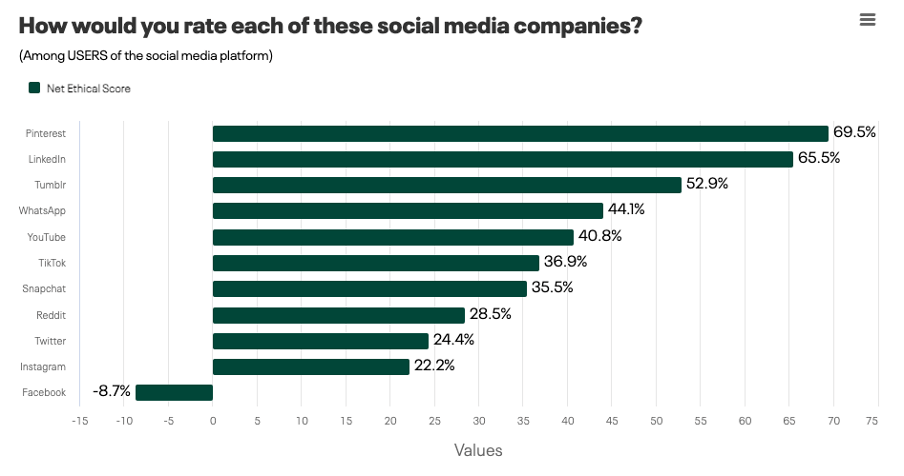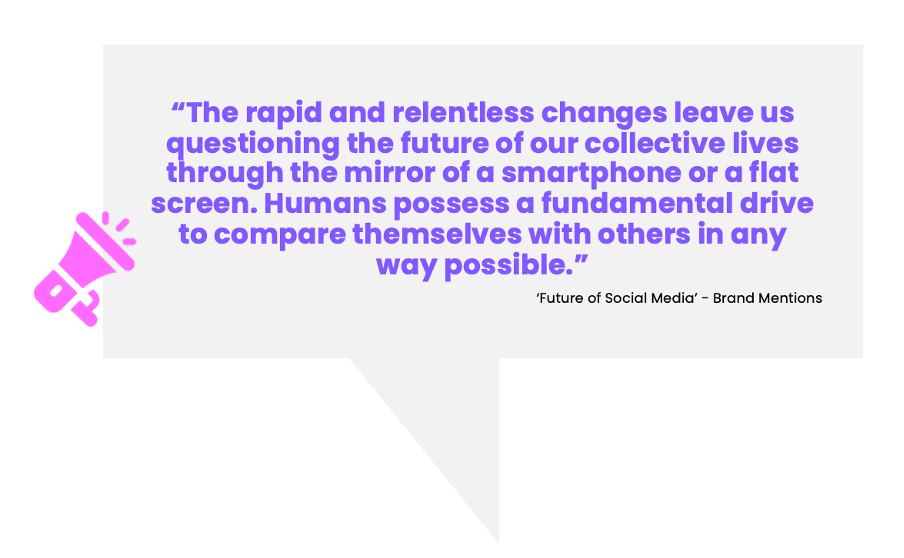This website uses cookies so that we can provide you with the best user experience possible. Cookie information is stored in your browser and performs functions such as recognising you when you return to our website and helping our team to understand which sections of the website you find most interesting and useful.
Social media can be a powerful tool for businesses, however it’s important as with any communications tool within your supply chain, to understand the ethical implications of choosing a particular platform.
“90% of social media marketers say building an active online community is critical to success in 2023. “- Global Social Media Trends Report, Hubspot & Brandwatch
As the wider discourse evolves in relation to the ethical impact of social media use, businesses should use this as an opportunity to review practises and recommendations to ensure a balanced view, aligning with values.

Changing Regulations
ESG reporting requires organisations to inspect every element of their supply chain – including their communications channels. If actions taken by a social media platform conflict with the stated goals of an organisation, is there justification for remaining on that platform? Even with any benefits the organisation receives from staying?
These are the questions that need to be asked.
But knowledge is power, and staying mindful of risk is the first step to staying ahead of any challenges.
Understanding User Sentiment
In recent months, there has been an upswell of press surrounding the ethical dealings of social platforms: the public perception of social media companies is changing.
The following graph illustrates how users perceive specific social platforms. Surprisingly, users seem to have conflicting interests – the most popular and widely used platforms are deemed the least ethical. There is a clear struggle between morality and the mainstream.

Graph: ‘How ethical are social media companies’ – Big Village, 2021’
However, there are still benefits to using the larger social media platforms within a multi-channel digital marketing strategy.
Direct to consumer conversation, unparalleled reach and fantastic functionality to showcase creative efforts.
But what are the risks?
Data Privacy
There has been criticism over data privacy practices across the majority of the popular social platforms, all relating to the way that user data is collected, stored and shared. One of the most notable concerns over the years comes from Meta, where the data of millions of Facebook users was harvested without their consent during the Cambridge Analytics scandal.
Both Instagram and Twitter have had concerns raised over the privacy and ethical use of personal information when it comes to targeted advertising, and some countries have banned TikTok from government or parliamentary devices over these concerns, including the UK, Norway, New Zealand and the Netherlands.
Harmful Content
It is important to be aware of the addictive qualities of social media. As a user, it’s easy to lose yourself in a cycle of constantly refreshing feeds and flitting in between each platform to satisfy that ever-growing need for content and instant gratification – otherwise known as ‘doomscrolling’.
This can have a detrimental effect to mental health, and some studies have linked social media use to negative outcomes such as depression, anxiety, and addiction.
Another issue is the handling of hate speech, misinformation, bullying and other harmful content. Whilst there have been steps taken to improve content moderation policies, concerns remain over the handling of user safety – including child safety and bullying.
Twitter’s fast-paced nature and limited character count can lead to miscommunication or misunderstandings, particularly when it comes to sensitive or controversial topics. One of the most prevalent issues is fake news and misinformation as it is easy for false information to spread quickly. Whereas TikTok’s potential for virality and rapid growth can create pressure for businesses to prioritise quantity over quality, which can lead to a lack of transparency or ethical concerns.
Trust & Honesty / Values
With a focus on aesthetics and visual content, platforms such as Instagram can also lead to businesses prioritising appearance over substance. This can be unethical if it leads to dishonest marketing practices or manipulative messaging. Additionally, the rise of influencer marketing may add to this, if influencers are promoting products or services without disclosing that they are being paid or incentivised to do so.
Twitter has other challenges when it comes to trustworthiness. The political and social dynamics can create ethical challenges for businesses that want to remain neutral or avoid controversy. Particularly around current events.
Trending topics and hashtags can also create pressure for businesses to participate in conversations or events that may not align with their values or brand messaging. This is something that can affect all social platforms.

As a business, there are several ethical principles to follow when using social media, to ensure they ultimately align with your values whilst still serving a commercial purpose;
- Transparency and honesty. Being honest about your products or services, and not making misleading claims in content. Similarly, when using influencer marketing, it is important to ensure the influencers are ethical and trustworthy and will be a suitable match for a brand in terms of values.
- User Privacy. Being open about the user data that is collected and how it is used, as well as ensuring consent is given before collection.
- Impact on society. Avoid discriminatory or offensive language, and be mindful of the impact your marketing has on users.
Virtue Signalling & Authenticity
With the prevalence of awareness days, global celebrations and cultural movements, it’s tempting for brands to want to signpost their commitment to every cause on social media, for fear of missing out, or fear of being reprimanded by their audiences. However, messaging should be grounded in substance to build true loyalty with social communities.
Black History Month and Pride Month are two classic examples of where brands do little more than adapt their profile logotypes to signpost their advocacy. Real commitment needs to go far deeper than this, and users are savvy to those brands who are disingenuous about their support – punishing them by simply disengaging.
But what impact do brands want to have? How far do they need to go to be authentic?
It is not as simple as just changing a logo or creating a one-time post using a hashtag. Actions over a longer period speak louder. Of course, it depends on the issue at hand. Last year many businesses shared content relating to the Ukrainian flag, and this symbology was enough to show unity. It is unrealistic to expect businesses from around the world to have had prior content or actions to show support of the country – but that doesn’t mean the action meant any less.
Alternative Platforms
The power of social media ultimately remains in the hands of the user, not the platform. Where the user chooses to spend time will dictate where brands choose to spend their resources. But which platforms will satisfy users of the future?
There are certain things we can be sure of;
- Edutainment is here to stay. People love informative content and the platforms that elevate learning will be favoured.
- AR will become more mainstream as the real and digital worlds blur together.
- Personalised content will become the norm, thanks to the huge libraries of data on our smart devices.
Newer platforms such as Supernova and WeAre8 are great examples of where social media could go, to become more ethical. Their advertising income is almost entirely distributed to either the user or charitable organisations – not their own pockets.
Closing Thoughts
Social media ethics are complex and multifaceted. It is difficult to pin down what is right or wrong, but conversations are needed to bring perspective into the discussion.
Ultimately, it requires a responsible approach that respects user privacy, and avoids harmful practices. Each brand needs to decide what is means to them, and this is something that should be continuously reviewed to ensure commercial vs ethical objects have balance.
Share this

